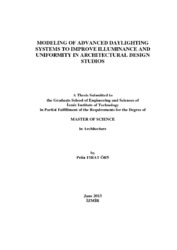Please use this identifier to cite or link to this item:
https://hdl.handle.net/11147/3612Full metadata record
| DC Field | Value | Language |
|---|---|---|
| dc.contributor.advisor | Kazanasmaz, Zehra Tuğçe | en |
| dc.contributor.author | Fırat Örs, Pelin | - |
| dc.date.accessioned | 2014-07-22T13:51:56Z | - |
| dc.date.available | 2014-07-22T13:51:56Z | - |
| dc.date.issued | 2013 | en |
| dc.identifier.uri | http://hdl.handle.net/11147/3612 | - |
| dc.description | Thesis (Master)--İzmir Institute of Technology, Architecture, İzmir, 2013 | en |
| dc.description | Includes bibliographical references (leaves: 140-145) | en |
| dc.description | Text in English; Abstract: Turkish and English | en |
| dc.description | xvi, 188 leaves | en |
| dc.description | Full text release delayed at author's request until 2016.07.24 | en |
| dc.description.abstract | The daylighting performance is an important asset that deeply affects the occupant's visual comfort. In study and work environments, it is crucial to maintain adequate and uniformly distributed daylight. Deficiencies in daylighting conditions of these environments may cause health problems, work performance loss and excessive energy consumption. The varying nature of daylight in daily and yearly basis is a strong challenge on that matter. Advanced daylighting systems have been developed to overcome this challenge. Improving the daylighting performance of existing buildings is another difficulty in daylighting design, since the aspects like orientation, window area and surrounding elements affect indoor illuminance levels and uniformity. Thus, daylighting design needs should be carefully considered at the initial design stages of the buildings. Regarding to these, four architectural design studios facing southwest, southeast, northwest and northeast were selected in Izmir Institute of Technology Faculty of Architecture. In these studios, daylighting measurements including illuminance at specific points were conducted in May and June 2012. The aim of this thesis is to improve the illuminance and uniformity in the selected studios. Simulation models were built in Ecotect; and the field measurements were then used to validate the Ecotect model. To reach the best daylighting performance, simulations were carried out by Desktop Radiance with applying advanced daylighting systems, namely laser cut panels, prismatic panels and light shelves. The simulation findings were analyzed and discussed. It is considered that retrofitting efforts after the construction would be inadequate regarding daylighting, unless complying with the standards during the design process. | en |
| dc.language.iso | en | en_US |
| dc.publisher | Izmir Institute of Technology | en |
| dc.rights | info:eu-repo/semantics/openAccess | en_US |
| dc.subject | Architectural design | en |
| dc.subject.lcsh | Daylighting | en |
| dc.title | Modeling of advanced daylighting systems to imporove illuminance and uniformity in architectural design studios | en_US |
| dc.type | Master Thesis | en_US |
| dc.authorid | 0000-0001-6547-8484 | - |
| dc.institutionauthor | Fırat Örs, Pelin | - |
| dc.department | Thesis (Master)--İzmir Institute of Technology, Architecture | en_US |
| dc.relation.publicationcategory | Tez | en_US |
| item.languageiso639-1 | en | - |
| item.fulltext | With Fulltext | - |
| item.openairecristype | http://purl.org/coar/resource_type/c_18cf | - |
| item.openairetype | Master Thesis | - |
| item.grantfulltext | open | - |
| item.cerifentitytype | Publications | - |
| Appears in Collections: | Master Degree / Yüksek Lisans Tezleri | |
Files in This Item:
| File | Description | Size | Format | |
|---|---|---|---|---|
| 10009710.pdf | MasterThesis | 12.88 MB | Adobe PDF |  View/Open |
CORE Recommender
Page view(s)
160
checked on Jul 22, 2024
Download(s)
106
checked on Jul 22, 2024
Google ScholarTM
Check
Items in GCRIS Repository are protected by copyright, with all rights reserved, unless otherwise indicated.